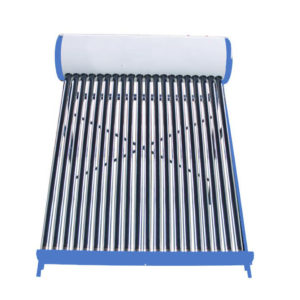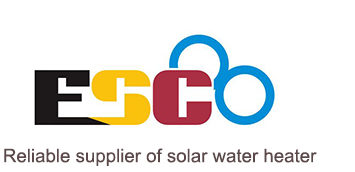How to buy solar water heater? We are the manufacturer of solar water heaters, we provide water heaters for sale, we can buy cheap products here. Just write me an email, Our solar panels are more efficient than diy black hoses, Here are the working principle for our solar water heaters.
We supply solar water heaters with better quality than Tata, and they are very affordable.

What are the advantages of solar water heaters?
- Availability of hot water through out the year: The solar water heater systems works throughout the year, it is only during the winter season you would have to heat the water more with the help of boiler or an immersion heater because water cools down quickly during winters.
- Free of Cost: We no need to pay any monthly charges for this system because this system does not require any electricity usage and uses just sunlight which is available free of cost.
- No pollution Problem: this system is a green and renewable it helps in the reduction of carbon dioxide gas.
Solar water heaters buying guide
consider the following before you buy.
- How much hot water do you need to generate?Lifestyle has a major impact on how effective your domestic solar water heater will be. If you have a large family and a great demand for hot water, especially during the day, an active system with a larger collector will probably fulfill your family’s needs.On the other hand, if your household consists of only one or two people and activities like laundry are infrequent, a smaller “batch,” or passive, system might be better.
- What is your budget? Solar heated domestic water does not have to be expensive. When compared to photovoltaic arrays, solar water heaters have a much faster return on investment and are much more affordable. For only a few hundred dollars, you can build your own batch-style system, and even commercially manufactured systems for warmer climates can be very affordable.
- How green do you want to go? If you are going to purchase a solar water heater, the benefits will be many, but a common goal is to reduce the overall need for carbon-based fuels like coal or natural gas. While the “greenest” and most economical option would be to simply alter your lifestyle so that you don’t use as much hot water (like taking “navy” showers, washing your clothes in cold water only, and turning down the temperature on your current hot water heater), installing a solar water heater can make a significant positive impact on the environment.
- Determine if your site is suitable. Most solar water heating systems are installed on the roof. For best results, you roof should:
- Receive direct sunlight between the hours of 10 AM and 4 PM year round
- Face South (within 15°)
- Be sturdy with the shingles in good condition
If your roof isn’t appropriate for a solar water heater, but you have suitable unshaded land next to your home, you may want to consider a ground-mounted system instead.
- Decide what type of system meets your needs and lifestyle. A solar water heater contractor will help you determine what type and size system best suits your needs. Take the following steps so you can have informed discussions with contractors during the purchasing process:
- Use the Product List to find qualified models for consideration.
- Understand how solar water heaters work so you can discuss which collector type and circulation system makes the most sense for you.
- Protect against freezing in colder climates. Some solar systems are appropriate for freezing climates, while others are not. As a general rule, if there is a good chance that temperatures will fall below 42°F, choose either a closed-loop system with antifreeze as the heat transfer fluid, or a system that automatically drains back when temperatures fall too low for comfort. Steer clear of batch systems if you live in a climate with distinct winters. Learn more about freeze protection.
- Estimate the capacity you’ll need. Use the gallon capacity of your current water heater as a starting point. You can find your current water heater’s capacity or volume on its nameplate or yellow Energy Guide sticker. This should help you discuss the sizing of your solar system with contractors. If you have recently added or are planning to add more occupants to your household or a new shower, faucet, dishwasher or washer that will be in frequent use, take that into account in your discussions.
- Contact a Solar Contractor or Manufacturer. Ideally, you will find a local contractor who can assess your site, provide recommendations, install a system, and then perform periodic maintenance. Installing a solar water heater on an existing home requires careful installation, which often includes running pipes through walls. Use a contractor certified by the North American Board of Certified Energy Practitioners (NABCEP)(link is external) if possible. When choosing a contractor you should also:
- Request cost estimates in writing.
- Ask for references.
- Check the company with your local Better Business Bureau.
- See if the company will obtain a local permit if necessary and understands local residential building codes and other regulations.
- Don’t forget about maintenance. After installing a solar system, it is important to perform periodic maintenance to ensure efficient operation. In addition to hiring a qualified contractor for annual maintenance inspections, you should periodically check the following:
- On the roof or ground, depending on installation:
- Collector is clean and not shaded
- Collector is sound, sealing and glazing are not cracked or yellowing
- Fasteners connecting collector to roof are sound
- Piping and wiring are well-connected, well-insulated, and without damage
- Roof penetrations are well-sealed
- In the home:
- Pressure relief valve is not stuck completely open or closed
- Pumps (in active systems) activate when the sun is shining
- Pipes are free of mineral build-up.
- On the roof or ground, depending on installation:
How does a solar water heater work?
Solar water heating systems include storage tanks and solar collectors. There are two types of solar water heating systems: active, which have circulating pumps and controls, and passive, which don’t.
Active Solar Water Heating Systems
There are two types of active solar water heating systems:
- Direct circulation systems
Pumps circulate household water through the collectors and into the home. They work well in climates where it rarely freezes. - Indirect circulation systems
Pumps circulate a non-freezing, heat-transfer fluid through the collectors and a heat exchanger. This heats the water that then flows into the home. They are popular in climates prone to freezing temperatures. - An active system requires a little more equipment—some kind of circulating pump and a few other components—and, because of this, it is generally more expensive and has more potential for things to go wrong. It requires electricity to run the pump, so it is also less energy efficient. On the flip side, it can provide abundant, continual hot water because the pump circulates the water through the system.
Passive Solar Water Heating Systems
Passive solar water heating systems are typically less expensive than active systems, but they’re usually not as efficient. However, passive systems can be more reliable and may last longer. There are two basic types of passive systems:
- Integral collector-storage passive systems
These work best in areas where temperatures rarely fall below freezing. They also work well in households with significant daytime and evening hot-water needs. - Thermosyphon systems
Water flows through the system when warm water rises as cooler water sinks. The collector must be installed below the storage tank so that warm water will rise into the tank. These systems are reliable, but contractors must pay careful attention to the roof design because of the heavy storage tank. They are usually more expensive than integral collector-storage passive systems.
Question:
Related Searches: Flat plate solar water heater | Electric storage water heater | Air source water heater
Want to know more?(Solar Water Heater)
Email: [email protected]
WhatsApp:+86 157 2077 3477
Skype :+86 157 2077 3477
